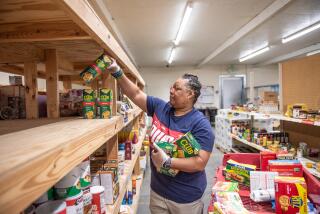Childhood obesity ads spark controversy in Georgia: ‘Horrible!’
- Share via
The childhood obesity ad is short, stark and to the point: A child named Tina says she doesn’t like going to school because the other kids pick on her. “It hurts my feelings,” she says.
Then text appears: “Stop sugarcoating it, Georgia.”
Children’s Healthcare of Atlanta felt not enough was being done to curb sky-high obesity rates in the state (Georgia has one of the highest childhod obesity rates in the country). Its Strong4Life campaign recently kicked off with a series of ads with kids and their parents talking about the toll that obesity can take.
“My doctor says I have something called hypertension,” says a girl named Maritza. “I just always thought she was thick, like her mama,” says the mother of a girl named Tamika.
The ads came about, ABC News reports, because some felt there was a dearth of strong messages about the dire consequences of being overweight in childhood. Linda Matzigkeit, senior vice president of Children’s Healthcare of Atlanta, was quoted as saying: “We needed something that was more arresting and in your face than some of the flowery campaigns out there.”
The campaign’s website states that almost 1 million George children are overweight or obese and that 75% of parents in the state who have children who are overweight or obese don’t recognize the problem. “We want to be the first southern state to fix the problem,” it states.
Not all healthcare experts see these ads, which are reminiscent of recent graphic anti-smoking ads, as the best approach. The Atlanta Journal-Constitution quotes Marsha Davis, a researcher in child obesity prevention at the University of Georgia’s College of Public Health, as saying: “If we want to get attention to say obesity is a problem, maybe they will be effective. In terms of the social stigma about weight -- it might actually make people feel worse about that.”
Comments on the the campaign’s Facebook page show the polarization the ads have brought about. Some examples:
“Horrible! As a 42 year old woman who struggled with anorexia as a teen and now a mother of a 6 year old girl who is taller and thicker than the average children her age and gets picked on by all ages including adults with inappropriate comments you have no idea obviously of the damage this will do with the ad. You will hurt more than you help. Self esteem is built with smiles and no pointing.”
“Although I appreciate your motives, you really do not understand the damage you are doing to children that have an issue...since your campaign has started the hurtful comments, teasing, bullying has escalated and your commercials are being ...touted as back up for this...I do wish you could find another way...please use this campaign to motivate, not to depreciate...”
“Thank you for standing up and bringing a national concern to light. These are the reasons our health care cost are going up. As a parent to two young kids ( 4 and 1) I understand the importance of my kids being active. These ads are to the lazy parents out there who are not part of their child’s life. Video games, tv and movies are not activities. I’m not ignorant to the fact that some kids inherit obesity, just disgusted by those parents who do not care about the health of their children.”
“Sure the fast food industry and its advertising is a huge problem; but when you are a child you eat what your parents feed you. Who cares if the adds entice them; don’t let them eat it! It is that easy. & for god sakes make them get up and move. The sedentary along with the junk food is the problem! I know plenty of kids who would love to eat crap all of the time, but aren’t allowed to. 75% of parents with obese children in GA think there isn’t a problem! Now, that is the problem! Stop feeding children what is convenient and make them a healthy meal.”
The Strong4Life site offers “Learn,” “Ask” and “Get Started” pages for families, featuring information, resources and tips on exercise, nutrition and losing weight.
The Let’s Move! childhood obesity campaign, developed by First Lady Michelle Obama, has focused on raising awareness of the issue as well as persuading restaurants and food manufacturers to offer more healthful kid-friendly foods and tamp down advertising geared toward kids.
How effective these new hot-button ads will be no one yet knows; the Journal-Constitution says the program is currently tracking that. The campaign’s second wave is coming up, and Matzigkeit told the paper those may not be well received either.
More to Read
Sign up for Essential California
The most important California stories and recommendations in your inbox every morning.
You may occasionally receive promotional content from the Los Angeles Times.













